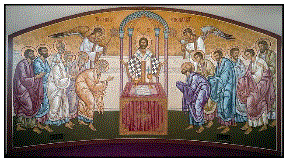During the past few weeks, I have been sharing ideas about a key Liturgical concept, namely anamnesis. I truly believe that a correct understanding of this idea changes, radically, the way that we experience the Divine Liturgy. I suggested that this word is found in the New Testament in one form or another.
The form found in 1 Corinthians (11:24-25), ἀνάμνησιν, occurs in only one instance in the New Testament outside of these two verses, that is in Luke’s account of the Last Supper (22:19). As one scholar points out, the nominative case noun ἀνάμνησις occurs only once in the New Testament, in Hebrews (10:3), and is also found only once in the Septuagint, in Numbers (10:10). In the latter case, the Israelites are told that their offerings and festivals will serve as a reminder of God’s perpetual presence in their midst.
In the letter to the Hebrews, the limitation of the high-priestly sin offering compared to the offering of the body of Jesus Christ once for all (Hebrews 10:10) is stressed: In those sacrifices there is only a yearly remembrance of sins (v 3) This same scholar assumes that the few incidences of the Greek ἀνάμνησιν and the Hebrew זִכָּרוֹן and of their variants, as well as the range of meaning of these words when they do occur in Scripture, indicate that the Christian notion of anamnesis as re-presenting before God an event in the past, so that it becomes here and now operative by its effects is based on myth. Citing another scholar, who, in his commentary on Luke’s Gospel, translates τουτο ποιειτε εἰς την ἐμην ἀνάμνησιν (Luke 22:19) as do this having me in mind, the scholar first quoted argues that anamnesis in Scripture normally signifies mere recalling or having in mind of a past event. He suggests that anamnesis, when understood as actualizing remembrance cannot find any basis in either the semantics of the word or in the Semitic usage of the first century. He also suggests that the primordial rites of primitive societies do not have anything to say to Christian faith.
Eastern liturgical scholars, however, disagree with this quoted scholar for several reasons. I hope to share these reasons in coming issues. It is truly the view of Eastern Liturgical scholars that our Liturgy is anamnetic, that is that it re-presents the past, in order to make the presence of Christ truly present to us as we celebrate.

